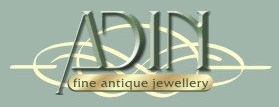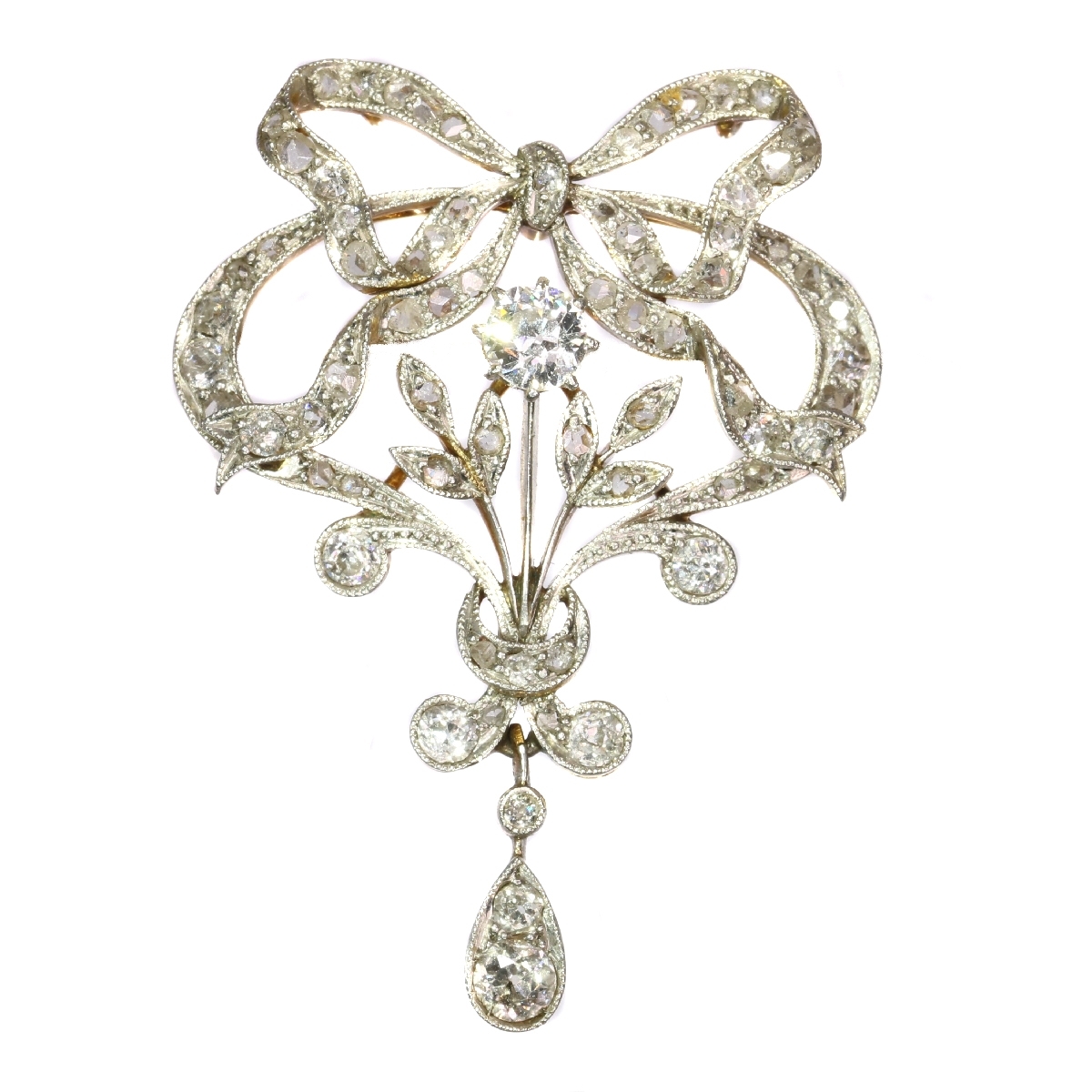Nu gespreide betaling mogelijk op het juweel van uw dromen! Vraag ons naar de details. Gratis verzekerde verzending van alle orders!
Belle Epoque brooch and pendant in guirland style with 72 diamonds
Antique jewelry object group: necklace with pendant that can be worn as a brooch too
Condition: very good condition
- (more info on our condition scale)
Country of origin:
Although it does not carry any legible control marks we believe this to be of Belgian origin.
Style:
something between the Late-Victorian and Belle Epoque style - Victorian decorative arts refers to the style of decorative arts during the Victorian era. The Victorian era is known for its eclectic revival and interpretation of historic styles and the
introduction of cross-cultural influences from the middle east and Asia in furniture, fittings, and Interior decoration.
Victorian design is widely viewed as having indulged in a regrettable excess of ornament.
And the Belle Époque style (Belle Époque is French for "Beautiful Era") was a period in European social history that began during the late 19th century and lasted until World War I. Occurring during the time of the French Third Republic
and the German Empire, the "Belle Époque" was named in retrospect, when it began to be considered a "golden age" the major powers of Europe, new technologies improved lives and the commercial arts adapted Renaissance and eighteenth-century styles
to modern forms. In the newly rich United States, emerging from the Panic of 1873, the comparable epoch was dubbed the Gilded Age. In the United Kingdom, this epoch overlaps the end of what is called the Victorian Era there and the period named the
Edwardian Era.
- See also: late-Victorian
or more info on styles
Style specifics:
The Belle Époque (French for "Beautiful Era") was a period in European social history that began during the late 19th century from the Franco-Prussian War (1870-1871) and lasted until World War I (1914-18).
Occurring during the time of the French Third Republic and the German Empire, the "Belle Époque" was named in retrospect, when it began to be considered a "golden age" the major powers of Europe, new technologies improved lives and the commercial
arts adapted Renaissance and eighteenth-century styles to modern forms.
In the newly rich United States, emerging from the Panic of 1873, the comparable epoch was dubbed the Gilded Age. In the United Kingdom, this epoch overlaps the end of what is called the Victorian Era there and the period named the Edwardian Era.
In the Belle Époque cheap coal and cheap labour contributed to the cult of the orchid and made possible the perfection of fruits grown under glass, as the apparatus of state dinners extended to the upper classes; champagne was perfected during the
Belle Époque. Exotic feathers and furs were more prominently featured in fashion than ever before, as haute couture was invented in Paris, the centre of the Belle Époque, where fashion began to move in a yearly cycle; in Paris restaurants
such as Maxim's achieved a new splendour and cachet as places for the rich to parade, and the Opéra Garnier devoted enormous spaces to staircases as similar show places.
After mid-century, railways linked all the major cities of Europe to spa towns like Biarritz and Deauville; their carriages were rigorously divided into first-class and second-class, but the super-rich now began to commission private railway coaches, as
exclusivity was a hallmark of opulent luxury. Bohemian lifestyles gained a different glamour, pursued in the cabarets of Montmartre.
Period: ca. 1890
- (events & facts of this era, poetry of this era,
fashion of this era)
Material: 18K yellow gold
and platinum
- (more info on precious metals)
Diamond(s):
One
old European cut diamond
with an estimated weight of ± 0.25ct.
(colour and clarity: G/I, si/i).
23
old brilliant cut diamonds
with an estimated weight of ± 0.80ct.
(colour and clarity: H/J, si/i).
48
rose cut diamonds and
senailles
. A senaille is a simplified rose cut diamond, a small diamond chip with perhaps a few polished facets. We do not have the weight of the rose cuts diamonds nor the senailles which is normal in our trade when it comes to rose cut diamonds and senailles.
Total diamond count: 72 pcs.
Total diamond weight:
(without rose cuts)
approx. 1.05 crt.
- All diamond weights, color grades and clarity are approximate since stones are not removed from their mounts to preserve the integrity of the setting.
Birthstones:
Diamond is the birthstone (or month stone) for April.
- (more info on birthstones)
Hallmarks: No trace.
- (more info on hallmarks)
Dimensions: pendant/brooch width and height 2,90 cm (1,14 inch) x 4,00 cm (1,57 inch), length necklace 46,00 cm (18,11 inch)
Weight: 11,40 gram (7,33 dwt)
Reference Nº: 19021-0012
Copyright photography: Adin, fine antique jewelry
platinum jewelry,
bi-color jewelry,
jewelry with rose cut diamonds,
jewelry with diamond,
latest acquisitions,
antique jewelry,
estate jewelry,
vintage jewelry or
modern jewelry
Jewelry with birthstones (or month stones) for:
January -
February -
March -
April -
May -
June -
July
August -
September -
October -
November or
December.
Additional information:
jewelry glossary -
wall of fame -
visit us in Antwerp -
subscribe to our mailinglist.
What is antique jewelry? -
What is estate jewelry? -
What is vintage jewelry?




